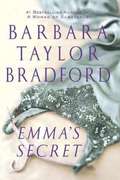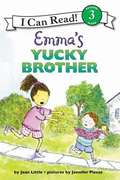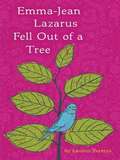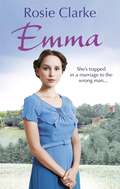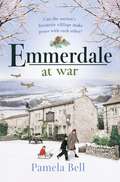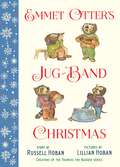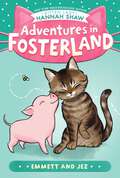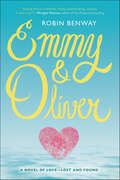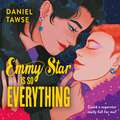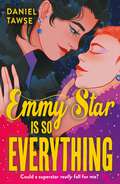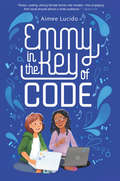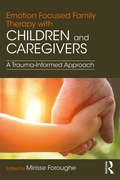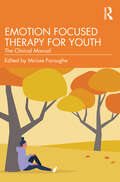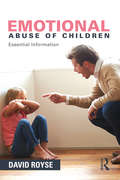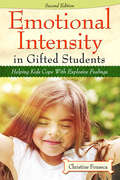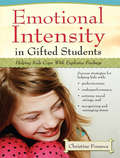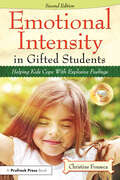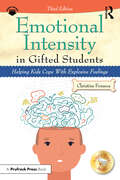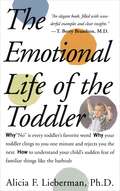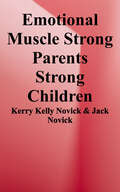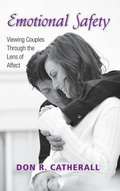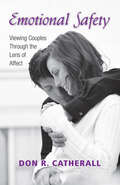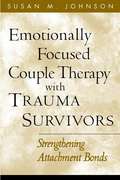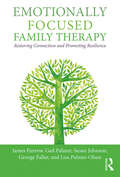- Table View
- List View
Emma's Secret (The Emma Harte Saga #4)
by Barbara Taylor BradfordPaula O'Neill, beloved granddaughter of Emma Harte and the guardian of her vast business empire, believes that everything Emma left to the family is secure.
Emma's Yucky Brother (I Can Read Level 3)
by Jean Little Jennifer PlecasEmma has always wanted a little brother. Now her family is adopting Max, and Emma is sure he will be the best brother ever. But Max has his own ideas. He thinks sisters are yucky, and that Emma is the yuckiest! Is this really what having a brother is all about? In Jean Little's warmhearted, perceptive story about adoption, Emma learns that there is more to having a little brother than she had ever guessed -- and that in order to get the brother she wants, she must first learn to be the sister he needs.
Emma-Jean Lazarus Fell Out of a Tree
by Lauren TarshisFrom a debut author comes a heart-warming novel about a unique girl and her seventhgrade experiences. Emma-Jean Lazarus is the smartest and strangest girl at William Gladstone Middle School. Her classmates don?t understand her, but that?s okay because Emma-Jean doesn?t quite get them either. But one afternoon, all that changes when she sees Colleen Pomerantz crying in the girl?s room. It is through Colleen that Emma-Jean gets a glimpse into what it is really like to be a seventh grader. And what she finds will send her tumbling out of a tree and questioning why she ever got involved in the first place.
Emma: (Emma Trilogy 1) (Emma Trilogy #1)
by Rosie ClarkeAll she has is her reputation…When Emma Robinson discovers she is carrying Paul Greenslade’s child, there are harsh consequences after he disappears rather than marry a common shop-girl.Forced by her tyrannical father to marry Richard Gillows, Emma learns quickly that a jealous husband is a violent one. How can Emma escape the ties that bind her, to build a life for herself and her child?From the author of The Downstairs Maid(Note: previously published as The Ties That Bind by Linda Sole)
Emmerdale at War: an uplifting and romantic read perfect for nights in (Emmerdale, Book 3)
by Pamela BellThe perfect Christmas gift full of warmth and nostalgia, for fans of ITV's Emmerdale, and readers who love heartwarming and heartbreaking stories set during World War II.Britain is at war once again and the families of Emmerdale are trying their best to cope with a new way of life.Rationing has been introduced across the country, two million more men have been called up for service, and blackouts, evacuees and military training camps have become the norm. In Beckindale, three young women are about to find their lives changed forever...Annie Pearson is working on Emmerdale Farm, while her love, Edward Sugden is at the front line. Lily Dingle has found purpose in joining the ATS, though she may get more than she bargained for. And Meg Warcup, now teaching at the local school, has taken in two children evacuated from Hull. They've adjusted to their new way of life until one day a German plane comes crashing down in the village... and changes everything in the village of Beckindale.The third novel in the Emmerdale series transports us to the Yorkshire Dales in the midst of World War II, exploring the lives of Emmerdale's much-loved families. Will the nation's favourite village overcome adversity to deal with the loves and lives lost?
Emmerdale at War: an uplifting and romantic read perfect for nights in (Emmerdale, Book 3) (Emmerdale)
by Pamela BellThe perfect Christmas gift full of warmth and nostalgia, for fans of ITV's Emmerdale, and readers who love heartwarming and heartbreaking stories set during World War II.Britain is at war once again and the families of Emmerdale are trying their best to cope with a new way of life.Rationing has been introduced across the country, two million more men have been called up for service, and blackouts, evacuees and military training camps have become the norm. In Beckindale, three young women are about to find their lives changed forever...Annie Pearson is working on Emmerdale Farm, while her love, Edward Sugden is at the front line. Lily Dingle has found purpose in joining the ATS, though she may get more than she bargained for. And Meg Warcup, now teaching at the local school, has taken in two children evacuated from Hull. They've adjusted to their new way of life until one day a German plane comes crashing down in the village... and changes everything in the village of Beckindale.The third novel in the Emmerdale series transports us to the Yorkshire Dales in the midst of World War II, exploring the lives of Emmerdale's much-loved families. Will the nation's favourite village overcome adversity to deal with the loves and lives lost?
Emmet Otter's Jug-Band Christmas
by Russell HobanCelebrate Christmas with the inspiration for the beloved Jim Henson film — in print after over 40 years. In 1977, when Jim Henson debuted the now-classic film Emmet Otter's Jug-Band Christmas, few knew it was based on a story written and illustrated by Russell and Lillian Hoban, creators of Bread and Jam for Frances and other treasured children's books. With an enduring score by the great Paul Williams, the movie remains a holiday tradition in homes across America. Now the book that started it all is back in print, in a beautiful gift edition that will thrill Muppets fans young and old. Inspired by the classic tale "The Gift of the Magi," the story begins in a poor country cottage, as Emmet Otter dreams of buying Ma a piano for Christmas, while Ma dreams of buying Emmet a guitar. When a village talent contest is announced, both imagine their dreams coming true. But what they don't imagine finding is their real reward — the power of love, family, and hope in hard times. It is a story that reaches into a reader's heart and reminds us all that fortune favors the brave. A Bank Street College of Education Best Children's Book of the Year "[A] welcome reissue of the Hobans' 1971 story . . . Colorful illustrations of the close-knit animal community contain plenty of warmth." —The Horn Book
Emmett and Jez (Adventures in Fosterland)
by Hannah ShawFrom New York Times bestselling author Hannah Shaw—also known as Kitten Lady—comes the first book in an exciting and heartwarming new chapter book series following kittens and other baby animals in Fosterland!When a tiny piglet named Emmett bounces off the truck carrying his mother and siblings, he&’s lost, hungry, and stuck on the side of the road. He has no idea where he&’s supposed to go, or where he belongs. Then a giant scoops Emmett up and takes him to a wonderful, magical place called Fosterland, where he meets a kitten named Jez. Emmett has a lot of questions, and once he hears all about life as a kitten, he decides it&’s much better than being a piglet. So, Emmett decides to just become a kitten instead! Problem solved. But as both Jez and Emmett grow older and realize they might be headed off to different forever homes, Emmett will have to confront his fears and face the scariest question of all: Is there a Foreverland out there for him?
Emmy & Oliver
by Robin BenwayEmmy and Oliver were going to be best friends forever, or maybe even more, before their futures were ripped apart. In Emmy's soul, despite the space and time between them, their connection has never been severed. But is their story still written in the stars? Or are their hearts like the pieces of two different puzzles—impossible to fit together?Emmy just wants to be in charge of her own life. . . . She wants to stay out late, surf her favorite beach—go anywhere without her parents' relentless worrying. But Emmy's parents can't seem to let her grow up—not since the day Oliver disappeared.Oliver needs a moment to figure out his heart. . . . He'd thought, all these years, that his dad was the good guy. He never knew that it was his father who had kidnapped him and kept him on the run. Discovering it, and finding himself returned to his old hometown, all at once, has his heart racing, and his thoughts swirling.Readers who love Sarah Dessen will devour these pages with hearts in throats as Emmy and Oliver struggle to face the messy, confusing consequences of Oliver's father's crime. Full of romance, coming-of-age emotion, and heartache, these two equally compelling characters create an unforgettable story.
Emmy Star is So Everything: A Joyful Queer Romance Set at Drama School
by Daniel TawseRocket has just gone through the worst summer ever. Which means it's the perfect time to start over in drama school in London ... Another joyful queer romance from Daniel Tawse, author of ALL ABOUT ROMANCE.It's September, and Rocket Middleton has just gone through the worst summer ever. Cruz Jones, the love of his life, the guy who he'd made so many life-plans with, has unceremoniously dumped him.Rocket decides it's time for a fresh start. Leaving his small northern town, he heads to London to attend drama school in the hopes of somehow learning to thrive again when his life seems completely broken.When Rocket arrives in London, school is awash with gossip. Emmy Star, the biggest young musician of the moment, is secretly attending school to train for a film opportunity. And when Rocket first meets Emmy, sparks fly. But could a famous young musician really be interested in Rocket? And just when Rocket might be starting to move on, their ex shows up. They don't call it drama school for nothing...A joyful, happy ever after queer romance for fans of Simon James Green and Becky Albertalli.
Emmy Star is So Everything: A Joyful Queer Romance Set at Drama School
by Daniel TawseRocket has just gone through the worst summer ever. Which means it's the perfect time to start over in drama school in London ... Another joyful queer romance from Daniel Tawse, author of ALL ABOUT ROMANCE.It's September, and Rocket Middleton has just gone through the worst summer ever. Cruz Jones, the love of his life, the guy who he'd made so many life-plans with, has unceremoniously dumped him.Rocket decides it's time for a fresh start. Leaving his small northern town, he heads to London to attend drama school in the hopes of somehow learning to thrive again when his life seems completely broken.When Rocket arrives in London, school is awash with gossip. Emmy Star, the biggest young musician of the moment, is secretly attending school to train for a film opportunity. And when Rocket first meets Emmy, sparks fly. But could a famous young musician really be interested in Rocket? And just when Rocket might be starting to move on, their ex shows up. They don't call it drama school for nothing...A joyful, happy ever after queer romance for fans of Simon James Green and Becky Albertalli.
Emmy in the Key of Code
by Aimee LucidoIn this innovative middle grade novel, coding and music take center stage as new girl Emmy tries to find her place in a new school. Perfect for fans of GIRLS WHO CODE series and THE CROSSOVER.In a new city, at a new school, twelve-year-old Emmy has never felt more out of tune. Things start to look up when she takes her first coding class, unexpectedly connecting with the material—and Abigail, a new friend—through a shared language: music. But when Emmy gets bad news about their computer teacher, and finds out Abigail isn’t being entirely honest about their friendship, she feels like her new life is screeching to a halt. Despite these obstacles, Emmy is determined to prove one thing: that, for the first time ever, she isn’t a wrong note, but a musician in the world's most beautiful symphony.
Emotion Focused Family Therapy with Children and Caregivers: A Trauma-Informed Approach
by Mirisse ForougheThis book introduces emotion focused family therapy (EFFT) as an evidence-based intervention for children through the integration of parent trauma treatment and emotion-focused techniques. A team of expert authors, including the founders of EFT and EFFT, contribute to the chapters, in which recent findings from longitudinal clinical trials are woven into a rich and deeply presented overview of using EFFT practically with clients. This immensely practical book also provides illustrative case studies, intervention strategies, and do’s and don’ts at the end of each chapter.
Emotion Focused Therapy for Youth: The Clinical Manual
by Mirisse ForougheThis edited collection is the first book of its kind to apply the theory, research, and teaching of Emotion Focused Therapy to youth and their families, equipping clinicians and students with the practical skills to facilitate individual, dyadic, and parent sessions confidently. Mirisse Foroughe is joined by an impressive group of internationally acclaimed contributors, including clinician-scientists and scholars, as well as the developer of Emotion Focused Therapy, Dr. Leslie Greenberg. This clinical manual offers a trauma-informed perspective on how to apply EFT for primary care of youth as well as more complex mental health difficulties. The manual begins with an incredibly user-friendly overview of core EFT principles before moving onto clinical applications with individual youth, parents, and dyads. The contributors then address how EFT can be implemented with specific client populations, such as youth with anxiety, depression, and borderline personality disorder, before examining important considerations that clinicians should bear in mind when working with parent and youth trauma and complex clinical presentations. Interweaving a trauma-informed perspective throughout, the manual is filled with practical summary tables, helpful tips, and eye-catching illustrations to ensure it is useful for students and experienced therapists. Emotion Focused Therapy for Youth is essential reading for marriage and family therapists, clinical social workers, and other mental health professionals working with youth and their families.
Emotional Abuse of Children: Essential Information
by David RoyseChildren and Emotional Abuse is a research-informed learning resource for students in social work about the dynamics and consequences of psychological abuse—especially as it occurs in dysfunctional families and affects children and adolescents. Emotional abuse is still not widely understood or recognized. Helping professionals need to recognize emotional abuse, understand the damage it does, the theories that account for it, and be prepared to help children and families where the abuse often occurs along with physical and sexual abuse. This text will draw upon current peer-reviewed literature and evidence-based studies and summarize essential information to prepare students for careers in helping professions. Each chapter will also contain brief vignettes to illustrate some of the key points. This book is for courses in child welfare and child abuse/neglect, as well as other social work courses that focus on children.
Emotional Intensity in Gifted Students
by Christine FonsecaTeaching children how to manage their intense emotions is one of the most difficult aspects of parenting or educating gifted children. Emotional Intensity in Gifted Students: Helping Kids Cope With Explosive Feelings provides a much-needed resource for parents and educators for understanding of why gifted children are so extreme in their behavior and how to manage the highs and lows that accompany emotional intensity. Presented in an easy-to-read, conversational style, this revised and updated second edition contains additional chapters addressing temperament and personality development, as well as expanded role-plays and strategies designed to show parents and teachers how to interact and guide gifted children in a way that teaches them how to recognize, monitor, and adjust their behavior. Updated resources and worksheets make this practical resource a must-read for anyone wishing to make a positive and lasting impact on the lives of gifted children.
Emotional Intensity in Gifted Students: Helping Kids Cope With Explosive Feelings
by Christine FonsecaDesigned to provide support for the difficult job of parenting and teaching gifted children, "Emotional Intensity in Gifted Students: Helping Kids Cope With Explosive Feelings" provides the resource parents and teachers need to not only understand why gifted children are so extreme in their behavior, but also learn specific strategies to teach gifted children how to live with their intensity. Presented in an easy-to-read, conversational style, "Emotional Intensity in Gifted Students" uses real-world examples through case studies and role-plays that show parents and teachers how to interact with gifted children in a way that teaches them how to recognize, monitor, and adjust their behavior. Worksheets, tip sheets, and checklists are included to help parents, teachers, and the students themselves learn to cope with the explosive feelings that often accompany giftedness. Specific strategies for stress management, underperformance in school, perfectionism, and social anxiety make this a must-read for anyone wishing to make a positive lasting impact on the lives of gifted children.
Emotional Intensity in Gifted Students: Helping Kids Cope With Explosive Feelings
by Christine FonsecaTeaching children how to manage their intense emotions is one of the most difficult aspects of parenting or educating gifted children. Emotional Intensity in Gifted Students: Helping Kids Cope With Explosive Feelings provides a much-needed resource for parents and educators for understanding of why gifted children are so extreme in their behavior and how to manage the highs and lows that accompany emotional intensity. Presented in an easy-to-read, conversational style, this revised and updated second edition contains additional chapters addressing temperament and personality development, as well as expanded role-plays and strategies designed to show parents and teachers how to interact and guide gifted children in a way that teaches them how to recognize, monitor, and adjust their behavior. Updated resources and worksheets make this practical resource a must-read for anyone wishing to make a positive and lasting impact on the lives of gifted children.
Emotional Intensity in Gifted Students: Helping Kids Cope With Explosive Feelings
by Christine FonsecaTeaching children how to manage their intense emotions is one of the most difficult aspects of parenting or educating gifted children. Emotional Intensity in Gifted Students is an indispensable resource for parents and educators seeking to understand why gifted children can be so extreme in their behavior and how to manage the highs and lows that accompany emotional intensity. Presented in an easy-to-read, conversational style, this revised and updated third edition pulls from contemporary research to depict changes in how we understand and support gifted children as well as an increased understanding of trauma, social-emotional learning, and empathy development. Chapters feature role-plays and strategies designed to show parents and teachers how to interact and guide gifted children in a way that teaches them how to recognize, monitor, and adjust their behavior. Also featuring updated resources, worksheets, and checklists, this practical new edition is a must-read for anyone wishing to make a positive and lasting impact on the lives of gifted children.
Emotional Life of the Toddler
by Alicia F. LiebermanAny parent who has followed an active toddler around for a day knows that a child of this age is a whirlwind of explosive, contradictory, and ever-changing emotions. Many books cover the physical and cognitive abilities of the toddler, but Lieberman's is the first to offer an in-depth examination of the varied and intense emotional life of children from ages one to three. Drawing on her lifelong research, Dr. Lieberman addresses commonly asked questions and issues. Why, for example, is "no" often the favorite response of the toddler? How should parents deal with the anger they sometimes feel in the face of their toddler's unflagging obstinacy? Why does a crying toddler run to his mother for a hug only to push himself vigorously away as soon as she begins to embrace him? With the help of numerous examples and vivid cases, Lieberman answers these and other questions, giving us, in the process, a rich, insightful profile of the roller coaster emotional world of the toddler. Lieberman shows that the toddler is torn between the strong desire to remain close to the parent and the equally compelling drive to explore new and exciting surroundings. The author discusses how a child can be helped to achieve a balance between these conflicting desires, to feel both confident and outgoing as well as protected and comforted when necessary. Lieberman also provides fascinating new material on how children's different temperaments express themselves during the toddler years and how parents can better match their own temperaments to their child's. Particular attention is given to the shy child and the very active child at this age. In addition, Lieberman gives new insights on how best to handle common toddler problems, such as sleep disturbances, sibling rivalry, and temper tantrums. She also provides invaluable information on the normal anxieties of this age and how to recognize when anxiety is excessive, needing special attention. Finally, she gives us a fresh, insightful picture of how toddlers typically handle the stress of their parents divorce and outside child care, and provides sensitive practical advice on easing the toddler through these transitions. The Emotional Life of the Toddler is an invaluable resource for parents, clinicians, researchers, and child-care workers alike.
Emotional Muscle: Strong Parents, Strong Children
by Kerry Kelly Novick Jack NovickThis book offers parents, grandparents, teachers and all who work with children useful ways to build EMOTIONAL MUSCLE. Your child can develop emotional muscles, like trust and adaptability for babies, empathy and agency in one-year-olds, resilience and mastery in two-year-olds, assertion and persistence in three-year-olds, internal controls and realistic standards in four-year-olds, cooperation and competence in five-year-olds and more. With these added strengths, your child will become a good friend to others, a responsible helper, a self-motivated learner, and be successful in meeting life's challenges. Emotional Muscle creates character.
Emotional Safety: Viewing Couples Through The Lens Of Affect
by Don CatherallEmotional Safety is designed to help couple therapists identify and conceptualize the problems of their clients and to provide solutions, focusing on the two central elements of emotion and attachment. Problems occur in relationships when the partners no longer feel safe being open and vulnerable with each other. Emotional Safety: Viewing Couples Through the Lens of Affect enables couple therapists to recognize and articulate the emotional subtext of their clients’ interactions. The emotional safety model is based on modern affect theory and focuses on the affective tone of messages in the areas of attachment and esteem. The model allows therapists to address the subtle interplay of perceived threat and emotional reaction which underlies their clients’ difficulties and disrupts emotional safety.
Emotional Safety: Viewing Couples Through the Lens of Affect
by Don R. CatherallEmotional Safety is designed to help couple therapists identify and conceptualize the problems of their clients and to provide solutions, focusing on the two central elements of emotion and attachment. Problems occur in relationships when the partners no longer feel safe being open and vulnerable with each other. Emotional Safety: Viewing Couples Through the Lens of Affect enables couple therapists to recognize and articulate the emotional subtext of their clients’ interactions. The emotional safety model is based on modern affect theory and focuses on the affective tone of messages in the areas of attachment and esteem. The model allows therapists to address the subtle interplay of perceived threat and emotional reaction which underlies their clients’ difficulties and disrupts emotional safety.
Emotionally Focused Couple Therapy with Trauma Survivors
by Susan M JohnsonThis book provides a theoretical framework and an innovative model of intervention for distressed couples whose relationships are affected by the echoes of trauma. Combining attachment theory, trauma research, and emotionally focused therapeutic techniques, Susan M. Johnson guides the clinician in modifying the interactional patterns that maintain traumatic stress and fostering positive, healing relationships among survivors and their partners. In-depth case material brings to life the process of assessment and treatment with couples coping with the impact of different kinds of trauma, including childhood abuse, serious illness, and combat experiences. The concluding chapter features valuable advice on therapist self-care.
Emotionally Focused Family Therapy: Restoring Connection and Promoting Resilience (The Guilford Family Therapy Series)
by Susan Johnson Gail Palmer James Furrow George Faller Lisa Palmer-OlsenEmotionally Focused Family Therapy is the definitive manual for applying the effectiveness of emotionally focused therapy (EFT) to the complexities of family life. The book sets out a theoretical framework for mental health professionals to enhance their conceptualization of family dynamics, considering a broad range of presenting problems and family groups. The first section applies EFT theory and principles to the practice of family therapy. The second section explicates the process of EFT and examines the interventions associated with the EFT approach to families. In the final section, the authors provide case examples of emotionally focused family therapy (EFFT) practice, with chapters on traumatic loss, stepfamilies, externalizing disorders, and internalizing disorders. Integrating up-to-date research with clinical transcripts and case examples throughout, Emotionally Focused Family Therapy is a must-read for therapists looking to promote the development and renewal of family relationships using the principles of EFT.
